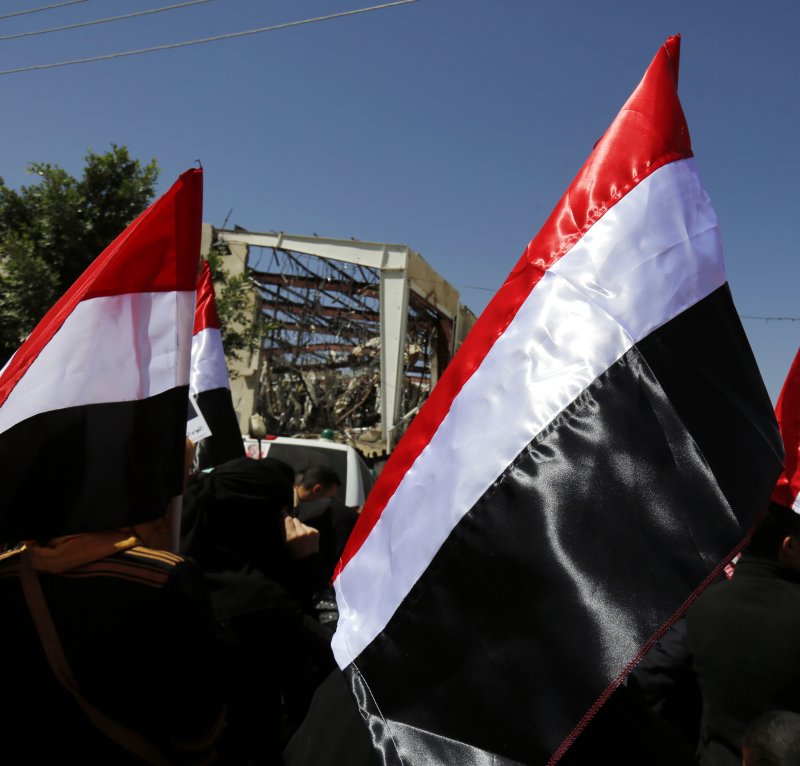Yemenis hold national flags during a protest rally in solidarity and honor of the dozens of victims of the Saudi-led airstrikes that hit a funeral hall on Oct. 8. The attacks killed 140 people and injured more than 500 others and was based on bad intelligence, officials ultimately said. Tuesday, news reports said the U.S. government has halted some arms sales to Riyadh out of concern for mounting civilian deaths in Yemen. File Photo by Yahya Arhab/European Pressphoto Agency
WASHINGTON, Dec. 13 (UPI) -- The U.S. government has stopped supplying some weapons and intelligence to Middle East ally Saudi Arabia, concerned that the materials may be fundamentally involved in the collateral deaths of civilians caught up in Yemen's civil war.
The policy change was outlined in multiple news reports Tuesday -- and effectively confirmed by State Department spokesman John Kirby -- which said President Barack Obama's administration decided to take "corrective" action to mitigate the substantial toll on Yemenis that's come with nearly two years of civil fighting.
Mounting civilian casualties have been reported in the war-scarred country, and Obama ordered a review of the situation in October after 140 civilian funeral goers were killed by a Saudi-led coalition airstrike meant for Shiite Houthi rebels.
Military officials said the errant strike was based on bad intelligence given to Saudi commanders. More than 500 people were wounded in the attack.
"I'm not going to get into the details, but there have been some adjustments made," Kirby said during a news briefing Tuesday. "Our review of support ... [is] based on continued concerns that we have about military operations there in Yemen, but also driven by our firm commitment to help Saudi Arabia defend itself against the threat across its border."
The Saudi-led air war over Yemen has been aggressive and aided at times by U.S. equipment and information.
Administration officials said Tuesday that many elements of U.S.-Saudi cooperation will continue, but precision-guided munitions will no longer be sold to Riyadh and certain intelligence that could facilitate similar haphazard strikes will now be limited.
A Yemeni man lies on a hospital gurney after he was injured in a Saudi-led airstrike that mistakenly targeted a funeral hall in Sana'a, Yemen, on Oct. 8. Tuesday, the U.S. government confirmed that a policy change has been implemented concerning Saudi support as a result of the civilian casualty toll in the civil war-torn country. File Photo by Yahya Arhab/European Pressphoto Agency
"This is not a punitive measure; it's a corrective measure," a senior U.S. official, who spoke on condition of anonymity, told The Washington Post. "We have to be careful not to cut back on things that serve our interests in the process of trying to cut back on things that don't serve our interest."
After the Oct. 8 attack on the Yemeni funeral, the White House warned the Saudis that U.S. aid is not a "blank check."
The Obama administration's pullback is almost certainly a reflection of an increasing hesitation by Washington to continue supplying military materials for an unpopular conflict that's repeatedly drawn near universal condemnation from the international community.
Saudi Arabia, a longtime U.S. ally, has been leading a coalition of armed forces to fight opposition factions in Yemen -- mainly Houthi rebels loyal to former president Ali Abdullah Saleh. Government forces under current leader Abdrabbuh Mansur Hadi have teamed with the Saudi coalition in an effort to stamp out the resistance..
Relations between Washington and Riyadh, though, have seen complications this year.
In September, Obama vetoed a U.S. bill to allow relatives of terrorism victims to sue foreign nations found to be complicit in attacks. The Senate, though, superseded the veto and put the Justice Against Sponsors of Terrorism Act (JASTA) into law. Though the bill applies to all foreign nations, many viewed it mostly as an attempt to put the Saudi government on the hook fiscally for the deadly suicide attacks in New York and D.C.
The Saudis reacted sternly to JASTA and said they would rethink their alliance with the United States -- a relationship that has often brought Riyadh geopolitical headaches from its Middle Eastern neighbors over the years.
"JASTA is a wake up call for the Saudis, that it is time to revisit the concept of the alliance with the United States," Saudi political sociologist Khalid al-Dakhil said at the time.
















